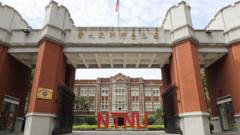Hong Kong's national security police have issued a warning against the Taiwanese video game "Reversed Front: Bonfire," claiming it incites armed revolution. This heavy-handed approach is emblematic of the increasing scrutiny on digital content deemed subversive by authorities.
Hong Kong’s Police Target Video Game Sparked by National Security Concerns

Hong Kong’s Police Target Video Game Sparked by National Security Concerns
The Taiwanese game "Reversed Front: Bonfire" faces a ban in Hong Kong for allegedly promoting armed revolt against China.
Hong Kong's national security police have intensified their crackdown on digital content, recently identifying a Taiwanese video game, "Reversed Front: Bonfire," as a target for censorship. Issued on a Tuesday, the warning characterizes the game as one that promotes "armed revolution," urging players to abstain from downloading or endorsing it to avoid severe legal repercussions.
Developed by a Taiwanese team, "Reversed Front: Bonfire" is a colorful, manga-styled war strategy game that allows players to assume roles such as "propagandists," "patrons," "spies," or "guerrillas." Participants can represent various regions, including Taiwan, Mongolia, and the Chinese regions of Hong Kong, Xinjiang, and Tibet, engaging in simulated plots and battles against the ruling Communist Party of China. Alternatively, players can choose the role of government forces.
Although the game was removed from Apple's app store in Hong Kong on Wednesday, it remains accessible in other locations. However, it had limited availability even before the ban; it was never offered in Mainland China and was recently removed from Google’s app store for allegedly containing hateful language, according to developer reports.
The creators, known as ESC Taiwan, comprise volunteers who are vocal opponents of the Chinese Communist Party. Their previous projects, including a board game released in 2020, rely on crowd-sourced funding. In a recent email, representatives from ESC Taiwan expressed that the game's ban illustrates the political censorship similar to that occurring in Mainland China: “Our game is precisely accusing and revealing such intentions,” they stated.
This incident reflects the ongoing struggle over content regulation in Hong Kong, which has seen increased scrutiny and censorship since the implementation of the national security law. The interplay between digital expression and government control continues to escalate as authorities seek to suppress any narratives perceived as a threat to state stability.


















